Investigating Project Management Soft Skills and Project Success Rates
VerifiedAdded on 2023/06/15
|48
|9555
|216
Report
AI Summary
This report investigates the significance of project management soft skills in achieving project success. It begins with an introduction that outlines the background, aims, objectives, research questions, problem statement, and rationale of the study, along with the research hypothesis and structure. The literature review provides an overview of project management soft skills, their advantages, and their relation to project success rates, while also addressing the challenges faced in implementing these skills. The research methodology chapter details the research philosophy, approach, design, data collection strategy, sampling, ethical considerations, and time horizons. Data analysis and findings are presented, including quantitative analysis, reliability analysis, and a correlation matrix. The report concludes with a summary of the findings, linking them back to the objectives, and offering recommendations for overcoming challenges and suggesting future research directions. The study uses recent refereed journal articles to support its analysis and draws conclusions based on primary data collected through online surveys.
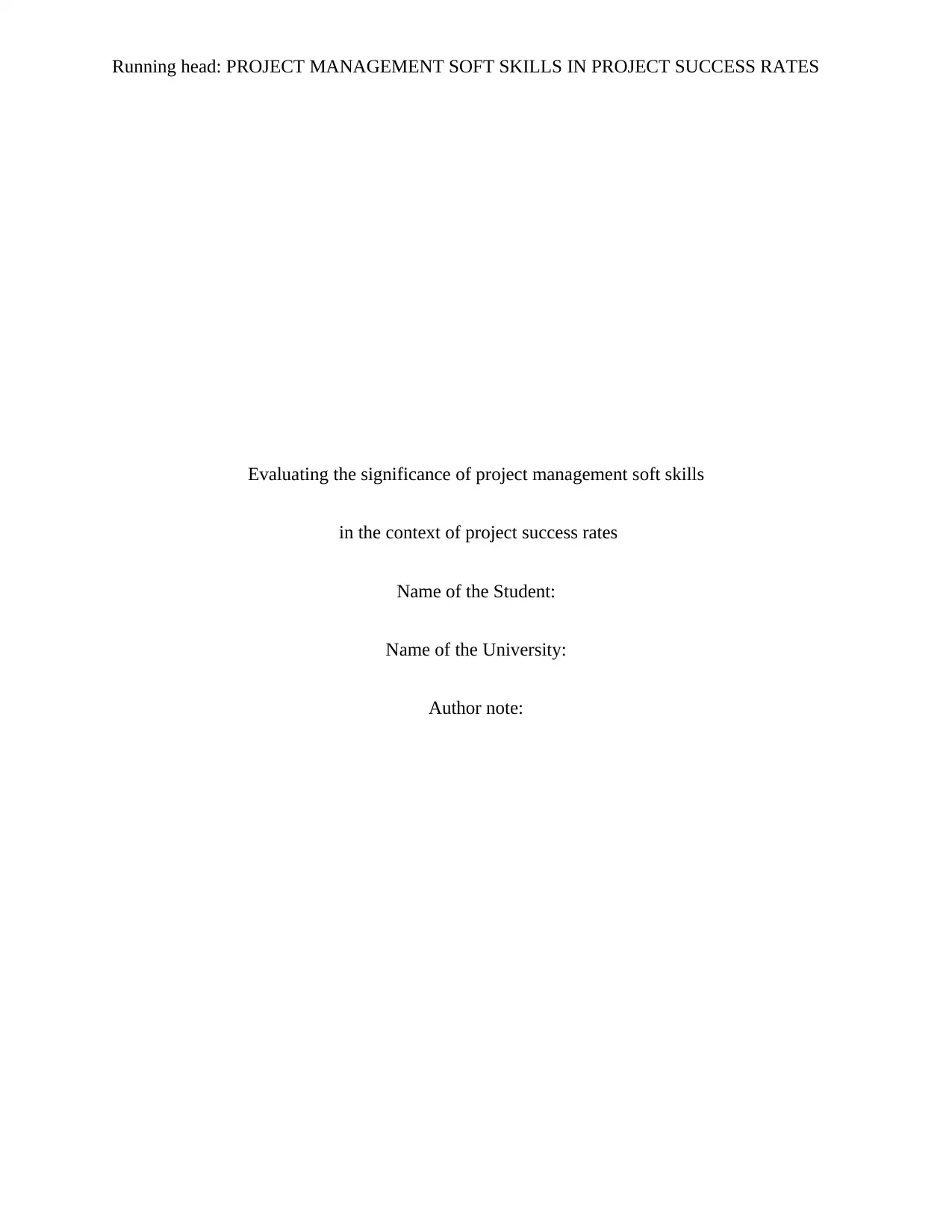
Running head: PROJECT MANAGEMENT SOFT SKILLS IN PROJECT SUCCESS RATES
Evaluating the significance of project management soft skills
in the context of project success rates
Name of the Student:
Name of the University:
Author note:
Evaluating the significance of project management soft skills
in the context of project success rates
Name of the Student:
Name of the University:
Author note:
Paraphrase This Document
Need a fresh take? Get an instant paraphrase of this document with our AI Paraphraser
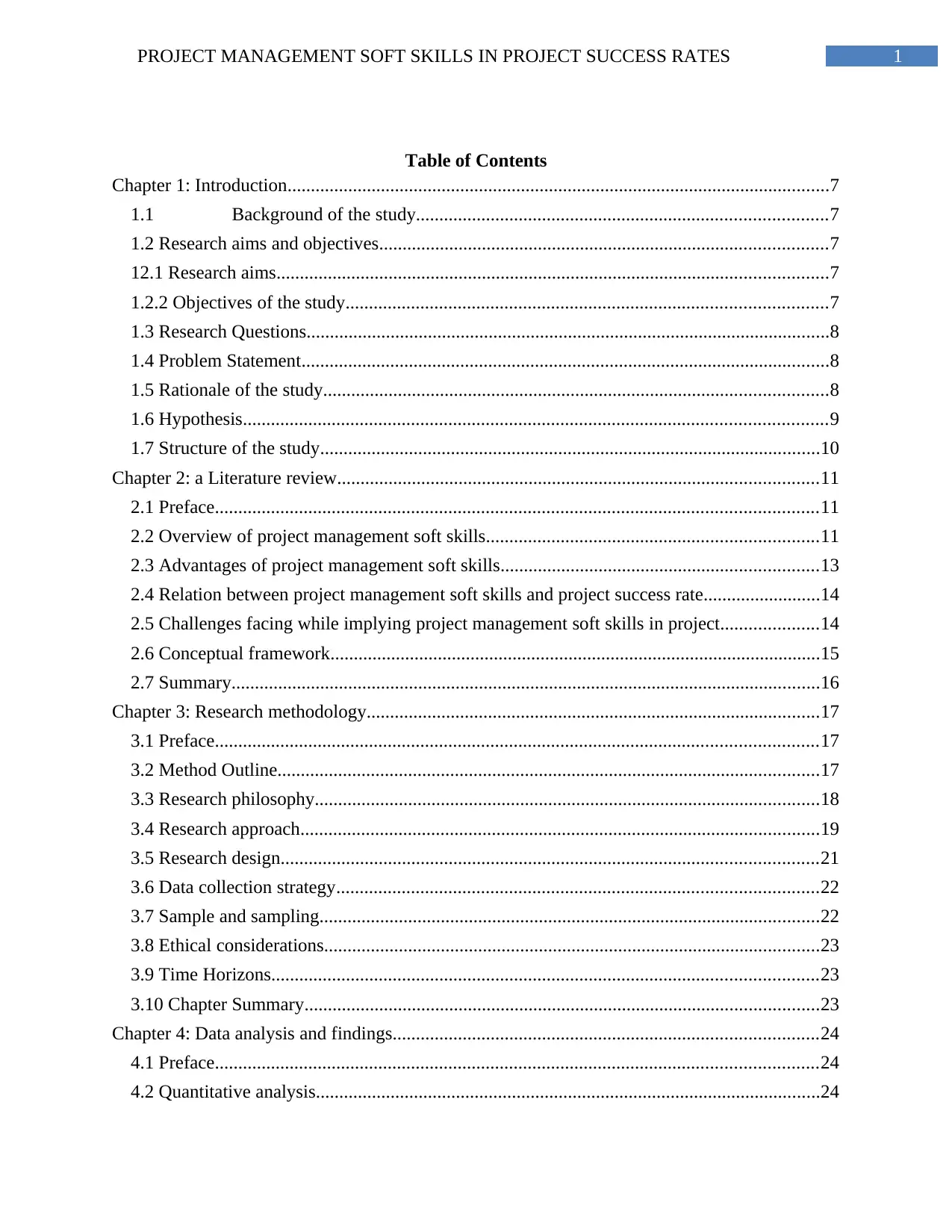
PROJECT MANAGEMENT SOFT SKILLS IN PROJECT SUCCESS RATES 1
Table of Contents
Chapter 1: Introduction....................................................................................................................7
1.1 Background of the study........................................................................................7
1.2 Research aims and objectives................................................................................................7
12.1 Research aims......................................................................................................................7
1.2.2 Objectives of the study.......................................................................................................7
1.3 Research Questions................................................................................................................8
1.4 Problem Statement.................................................................................................................8
1.5 Rationale of the study............................................................................................................8
1.6 Hypothesis.............................................................................................................................9
1.7 Structure of the study...........................................................................................................10
Chapter 2: a Literature review.......................................................................................................11
2.1 Preface.................................................................................................................................11
2.2 Overview of project management soft skills.......................................................................11
2.3 Advantages of project management soft skills....................................................................13
2.4 Relation between project management soft skills and project success rate.........................14
2.5 Challenges facing while implying project management soft skills in project.....................14
2.6 Conceptual framework.........................................................................................................15
2.7 Summary..............................................................................................................................16
Chapter 3: Research methodology.................................................................................................17
3.1 Preface.................................................................................................................................17
3.2 Method Outline....................................................................................................................17
3.3 Research philosophy............................................................................................................18
3.4 Research approach...............................................................................................................19
3.5 Research design...................................................................................................................21
3.6 Data collection strategy.......................................................................................................22
3.7 Sample and sampling...........................................................................................................22
3.8 Ethical considerations..........................................................................................................23
3.9 Time Horizons.....................................................................................................................23
3.10 Chapter Summary..............................................................................................................23
Chapter 4: Data analysis and findings...........................................................................................24
4.1 Preface.................................................................................................................................24
4.2 Quantitative analysis............................................................................................................24
Table of Contents
Chapter 1: Introduction....................................................................................................................7
1.1 Background of the study........................................................................................7
1.2 Research aims and objectives................................................................................................7
12.1 Research aims......................................................................................................................7
1.2.2 Objectives of the study.......................................................................................................7
1.3 Research Questions................................................................................................................8
1.4 Problem Statement.................................................................................................................8
1.5 Rationale of the study............................................................................................................8
1.6 Hypothesis.............................................................................................................................9
1.7 Structure of the study...........................................................................................................10
Chapter 2: a Literature review.......................................................................................................11
2.1 Preface.................................................................................................................................11
2.2 Overview of project management soft skills.......................................................................11
2.3 Advantages of project management soft skills....................................................................13
2.4 Relation between project management soft skills and project success rate.........................14
2.5 Challenges facing while implying project management soft skills in project.....................14
2.6 Conceptual framework.........................................................................................................15
2.7 Summary..............................................................................................................................16
Chapter 3: Research methodology.................................................................................................17
3.1 Preface.................................................................................................................................17
3.2 Method Outline....................................................................................................................17
3.3 Research philosophy............................................................................................................18
3.4 Research approach...............................................................................................................19
3.5 Research design...................................................................................................................21
3.6 Data collection strategy.......................................................................................................22
3.7 Sample and sampling...........................................................................................................22
3.8 Ethical considerations..........................................................................................................23
3.9 Time Horizons.....................................................................................................................23
3.10 Chapter Summary..............................................................................................................23
Chapter 4: Data analysis and findings...........................................................................................24
4.1 Preface.................................................................................................................................24
4.2 Quantitative analysis............................................................................................................24
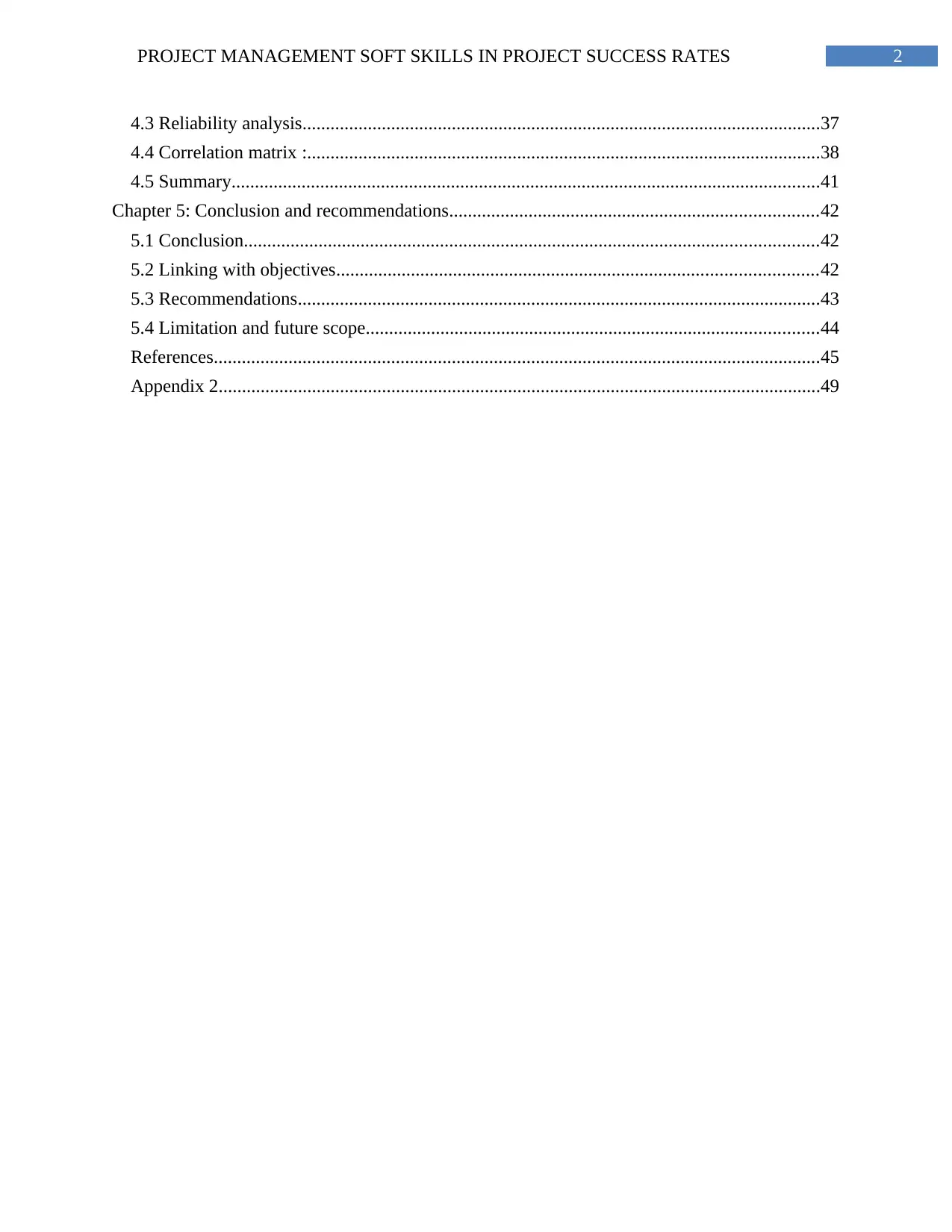
PROJECT MANAGEMENT SOFT SKILLS IN PROJECT SUCCESS RATES 2
4.3 Reliability analysis...............................................................................................................37
4.4 Correlation matrix :..............................................................................................................38
4.5 Summary..............................................................................................................................41
Chapter 5: Conclusion and recommendations...............................................................................42
5.1 Conclusion...........................................................................................................................42
5.2 Linking with objectives.......................................................................................................42
5.3 Recommendations................................................................................................................43
5.4 Limitation and future scope.................................................................................................44
References..................................................................................................................................45
Appendix 2.................................................................................................................................49
4.3 Reliability analysis...............................................................................................................37
4.4 Correlation matrix :..............................................................................................................38
4.5 Summary..............................................................................................................................41
Chapter 5: Conclusion and recommendations...............................................................................42
5.1 Conclusion...........................................................................................................................42
5.2 Linking with objectives.......................................................................................................42
5.3 Recommendations................................................................................................................43
5.4 Limitation and future scope.................................................................................................44
References..................................................................................................................................45
Appendix 2.................................................................................................................................49
⊘ This is a preview!⊘
Do you want full access?
Subscribe today to unlock all pages.

Trusted by 1+ million students worldwide
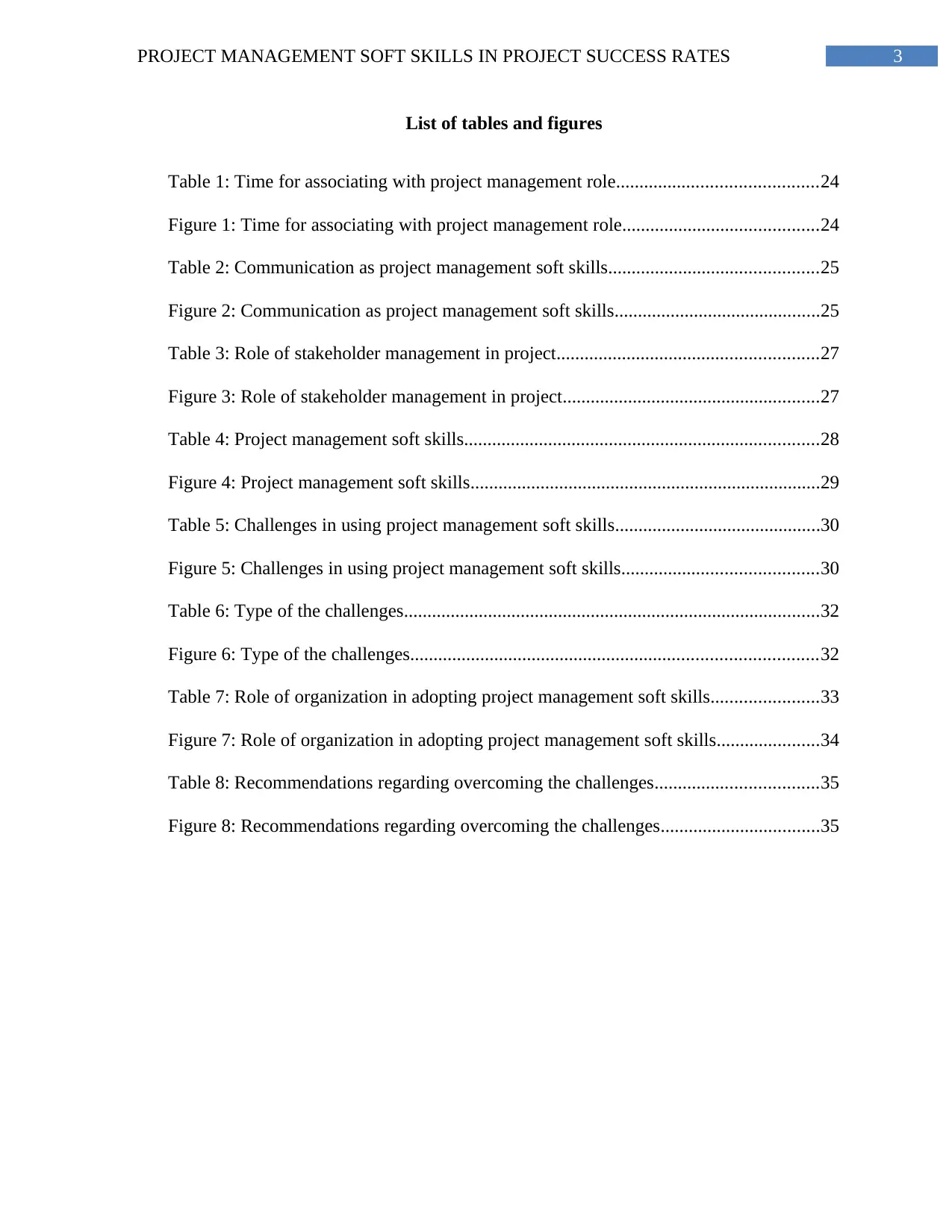
PROJECT MANAGEMENT SOFT SKILLS IN PROJECT SUCCESS RATES 3
List of tables and figures
Table 1: Time for associating with project management role...........................................24
Figure 1: Time for associating with project management role..........................................24
Table 2: Communication as project management soft skills.............................................25
Figure 2: Communication as project management soft skills............................................25
Table 3: Role of stakeholder management in project........................................................27
Figure 3: Role of stakeholder management in project.......................................................27
Table 4: Project management soft skills............................................................................28
Figure 4: Project management soft skills...........................................................................29
Table 5: Challenges in using project management soft skills............................................30
Figure 5: Challenges in using project management soft skills..........................................30
Table 6: Type of the challenges.........................................................................................32
Figure 6: Type of the challenges.......................................................................................32
Table 7: Role of organization in adopting project management soft skills.......................33
Figure 7: Role of organization in adopting project management soft skills......................34
Table 8: Recommendations regarding overcoming the challenges...................................35
Figure 8: Recommendations regarding overcoming the challenges..................................35
List of tables and figures
Table 1: Time for associating with project management role...........................................24
Figure 1: Time for associating with project management role..........................................24
Table 2: Communication as project management soft skills.............................................25
Figure 2: Communication as project management soft skills............................................25
Table 3: Role of stakeholder management in project........................................................27
Figure 3: Role of stakeholder management in project.......................................................27
Table 4: Project management soft skills............................................................................28
Figure 4: Project management soft skills...........................................................................29
Table 5: Challenges in using project management soft skills............................................30
Figure 5: Challenges in using project management soft skills..........................................30
Table 6: Type of the challenges.........................................................................................32
Figure 6: Type of the challenges.......................................................................................32
Table 7: Role of organization in adopting project management soft skills.......................33
Figure 7: Role of organization in adopting project management soft skills......................34
Table 8: Recommendations regarding overcoming the challenges...................................35
Figure 8: Recommendations regarding overcoming the challenges..................................35
Paraphrase This Document
Need a fresh take? Get an instant paraphrase of this document with our AI Paraphraser
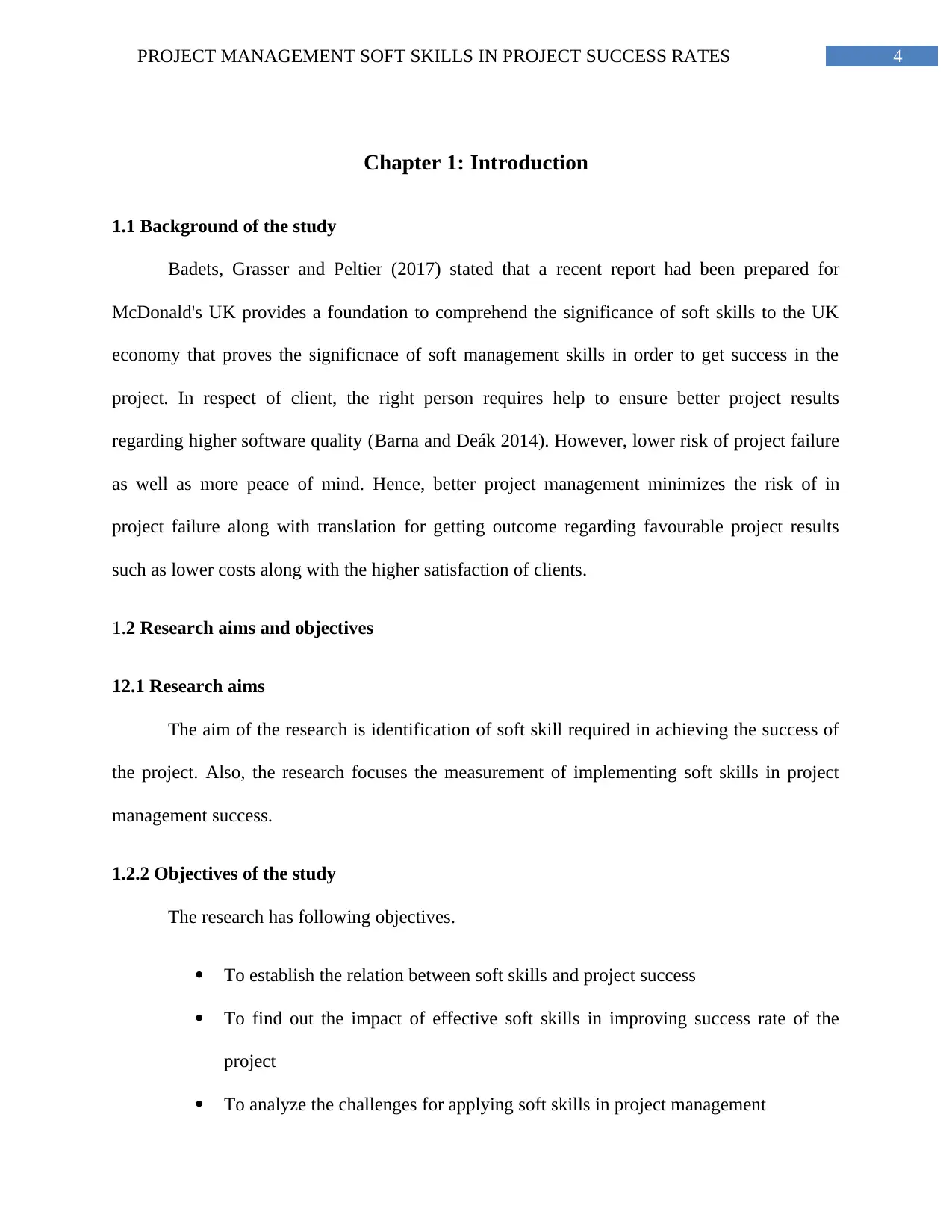
PROJECT MANAGEMENT SOFT SKILLS IN PROJECT SUCCESS RATES 4
Chapter 1: Introduction
1.1 Background of the study
Badets, Grasser and Peltier (2017) stated that a recent report had been prepared for
McDonald's UK provides a foundation to comprehend the significance of soft skills to the UK
economy that proves the significnace of soft management skills in order to get success in the
project. In respect of client, the right person requires help to ensure better project results
regarding higher software quality (Barna and Deák 2014). However, lower risk of project failure
as well as more peace of mind. Hence, better project management minimizes the risk of in
project failure along with translation for getting outcome regarding favourable project results
such as lower costs along with the higher satisfaction of clients.
1.2 Research aims and objectives
12.1 Research aims
The aim of the research is identification of soft skill required in achieving the success of
the project. Also, the research focuses the measurement of implementing soft skills in project
management success.
1.2.2 Objectives of the study
The research has following objectives.
To establish the relation between soft skills and project success
To find out the impact of effective soft skills in improving success rate of the
project
To analyze the challenges for applying soft skills in project management
Chapter 1: Introduction
1.1 Background of the study
Badets, Grasser and Peltier (2017) stated that a recent report had been prepared for
McDonald's UK provides a foundation to comprehend the significance of soft skills to the UK
economy that proves the significnace of soft management skills in order to get success in the
project. In respect of client, the right person requires help to ensure better project results
regarding higher software quality (Barna and Deák 2014). However, lower risk of project failure
as well as more peace of mind. Hence, better project management minimizes the risk of in
project failure along with translation for getting outcome regarding favourable project results
such as lower costs along with the higher satisfaction of clients.
1.2 Research aims and objectives
12.1 Research aims
The aim of the research is identification of soft skill required in achieving the success of
the project. Also, the research focuses the measurement of implementing soft skills in project
management success.
1.2.2 Objectives of the study
The research has following objectives.
To establish the relation between soft skills and project success
To find out the impact of effective soft skills in improving success rate of the
project
To analyze the challenges for applying soft skills in project management
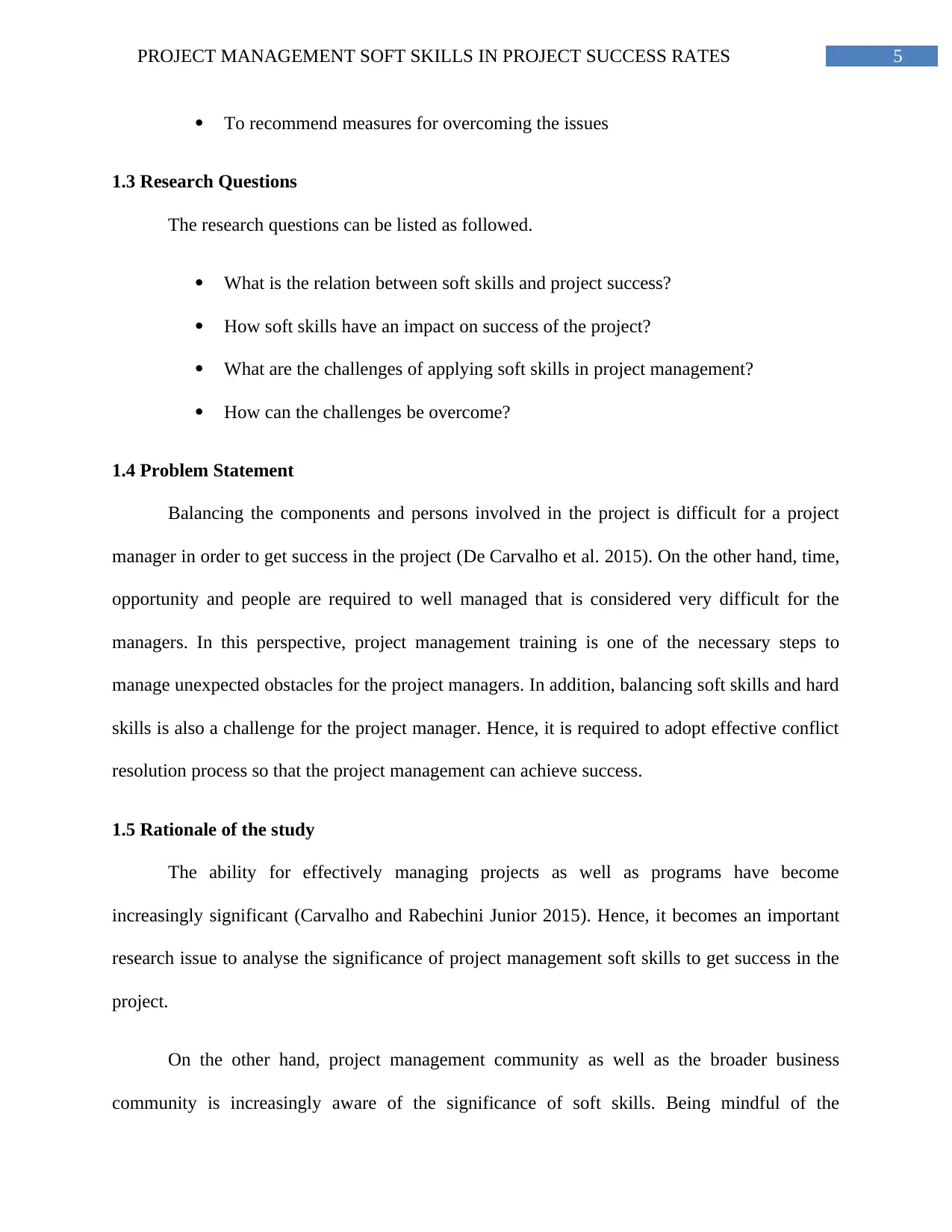
PROJECT MANAGEMENT SOFT SKILLS IN PROJECT SUCCESS RATES 5
To recommend measures for overcoming the issues
1.3 Research Questions
The research questions can be listed as followed.
What is the relation between soft skills and project success?
How soft skills have an impact on success of the project?
What are the challenges of applying soft skills in project management?
How can the challenges be overcome?
1.4 Problem Statement
Balancing the components and persons involved in the project is difficult for a project
manager in order to get success in the project (De Carvalho et al. 2015). On the other hand, time,
opportunity and people are required to well managed that is considered very difficult for the
managers. In this perspective, project management training is one of the necessary steps to
manage unexpected obstacles for the project managers. In addition, balancing soft skills and hard
skills is also a challenge for the project manager. Hence, it is required to adopt effective conflict
resolution process so that the project management can achieve success.
1.5 Rationale of the study
The ability for effectively managing projects as well as programs have become
increasingly significant (Carvalho and Rabechini Junior 2015). Hence, it becomes an important
research issue to analyse the significance of project management soft skills to get success in the
project.
On the other hand, project management community as well as the broader business
community is increasingly aware of the significance of soft skills. Being mindful of the
To recommend measures for overcoming the issues
1.3 Research Questions
The research questions can be listed as followed.
What is the relation between soft skills and project success?
How soft skills have an impact on success of the project?
What are the challenges of applying soft skills in project management?
How can the challenges be overcome?
1.4 Problem Statement
Balancing the components and persons involved in the project is difficult for a project
manager in order to get success in the project (De Carvalho et al. 2015). On the other hand, time,
opportunity and people are required to well managed that is considered very difficult for the
managers. In this perspective, project management training is one of the necessary steps to
manage unexpected obstacles for the project managers. In addition, balancing soft skills and hard
skills is also a challenge for the project manager. Hence, it is required to adopt effective conflict
resolution process so that the project management can achieve success.
1.5 Rationale of the study
The ability for effectively managing projects as well as programs have become
increasingly significant (Carvalho and Rabechini Junior 2015). Hence, it becomes an important
research issue to analyse the significance of project management soft skills to get success in the
project.
On the other hand, project management community as well as the broader business
community is increasingly aware of the significance of soft skills. Being mindful of the
⊘ This is a preview!⊘
Do you want full access?
Subscribe today to unlock all pages.

Trusted by 1+ million students worldwide
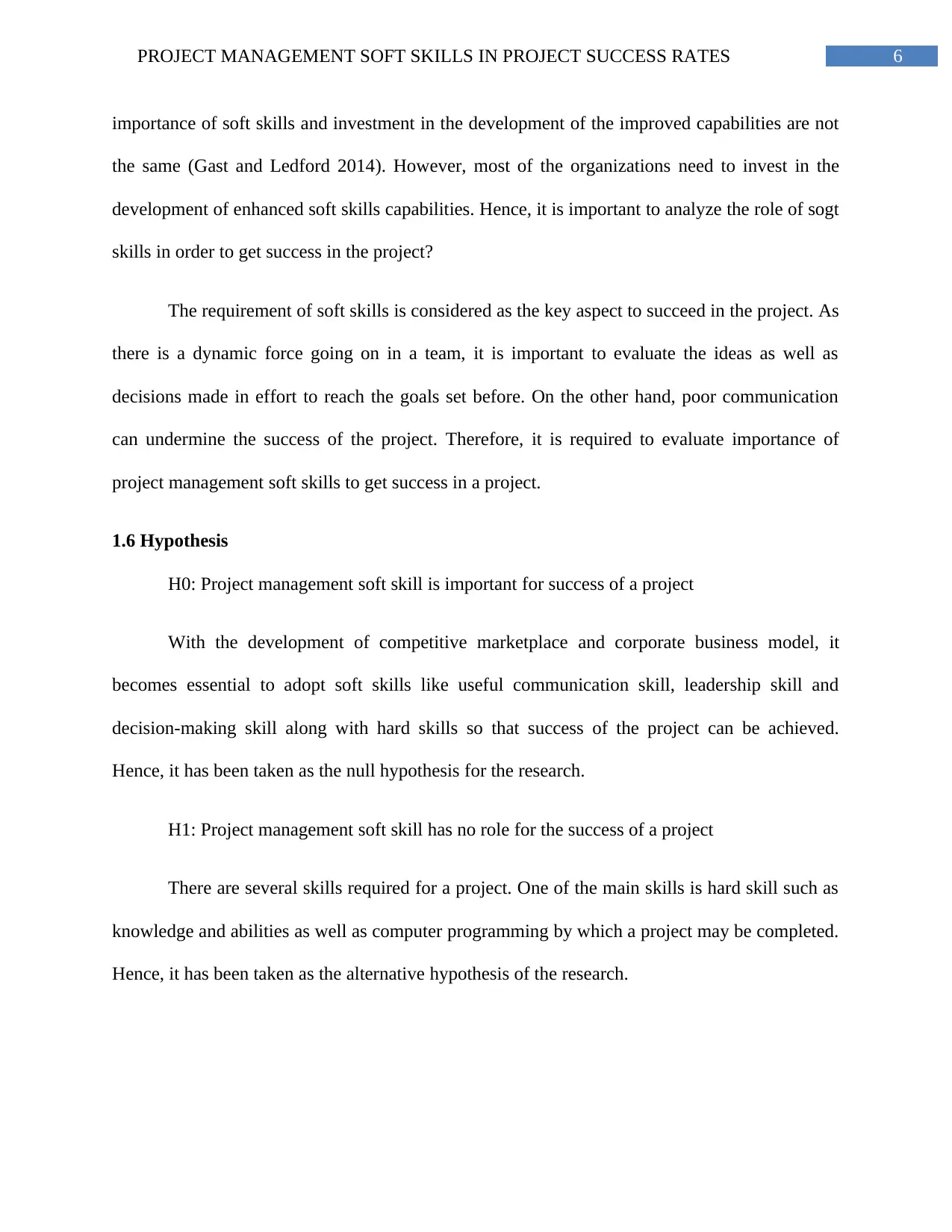
PROJECT MANAGEMENT SOFT SKILLS IN PROJECT SUCCESS RATES 6
importance of soft skills and investment in the development of the improved capabilities are not
the same (Gast and Ledford 2014). However, most of the organizations need to invest in the
development of enhanced soft skills capabilities. Hence, it is important to analyze the role of sogt
skills in order to get success in the project?
The requirement of soft skills is considered as the key aspect to succeed in the project. As
there is a dynamic force going on in a team, it is important to evaluate the ideas as well as
decisions made in effort to reach the goals set before. On the other hand, poor communication
can undermine the success of the project. Therefore, it is required to evaluate importance of
project management soft skills to get success in a project.
1.6 Hypothesis
H0: Project management soft skill is important for success of a project
With the development of competitive marketplace and corporate business model, it
becomes essential to adopt soft skills like useful communication skill, leadership skill and
decision-making skill along with hard skills so that success of the project can be achieved.
Hence, it has been taken as the null hypothesis for the research.
H1: Project management soft skill has no role for the success of a project
There are several skills required for a project. One of the main skills is hard skill such as
knowledge and abilities as well as computer programming by which a project may be completed.
Hence, it has been taken as the alternative hypothesis of the research.
importance of soft skills and investment in the development of the improved capabilities are not
the same (Gast and Ledford 2014). However, most of the organizations need to invest in the
development of enhanced soft skills capabilities. Hence, it is important to analyze the role of sogt
skills in order to get success in the project?
The requirement of soft skills is considered as the key aspect to succeed in the project. As
there is a dynamic force going on in a team, it is important to evaluate the ideas as well as
decisions made in effort to reach the goals set before. On the other hand, poor communication
can undermine the success of the project. Therefore, it is required to evaluate importance of
project management soft skills to get success in a project.
1.6 Hypothesis
H0: Project management soft skill is important for success of a project
With the development of competitive marketplace and corporate business model, it
becomes essential to adopt soft skills like useful communication skill, leadership skill and
decision-making skill along with hard skills so that success of the project can be achieved.
Hence, it has been taken as the null hypothesis for the research.
H1: Project management soft skill has no role for the success of a project
There are several skills required for a project. One of the main skills is hard skill such as
knowledge and abilities as well as computer programming by which a project may be completed.
Hence, it has been taken as the alternative hypothesis of the research.
Paraphrase This Document
Need a fresh take? Get an instant paraphrase of this document with our AI Paraphraser
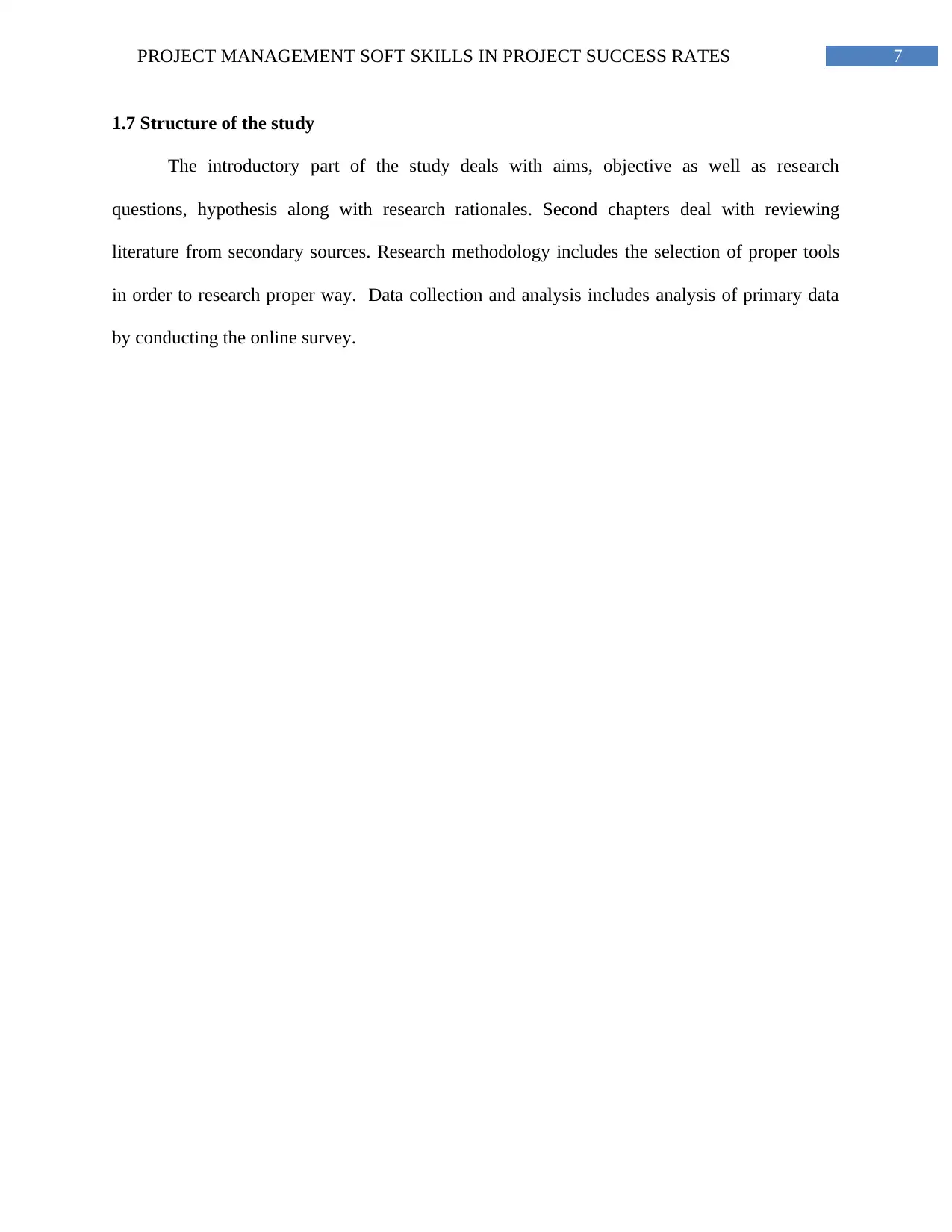
PROJECT MANAGEMENT SOFT SKILLS IN PROJECT SUCCESS RATES 7
1.7 Structure of the study
The introductory part of the study deals with aims, objective as well as research
questions, hypothesis along with research rationales. Second chapters deal with reviewing
literature from secondary sources. Research methodology includes the selection of proper tools
in order to research proper way. Data collection and analysis includes analysis of primary data
by conducting the online survey.
1.7 Structure of the study
The introductory part of the study deals with aims, objective as well as research
questions, hypothesis along with research rationales. Second chapters deal with reviewing
literature from secondary sources. Research methodology includes the selection of proper tools
in order to research proper way. Data collection and analysis includes analysis of primary data
by conducting the online survey.
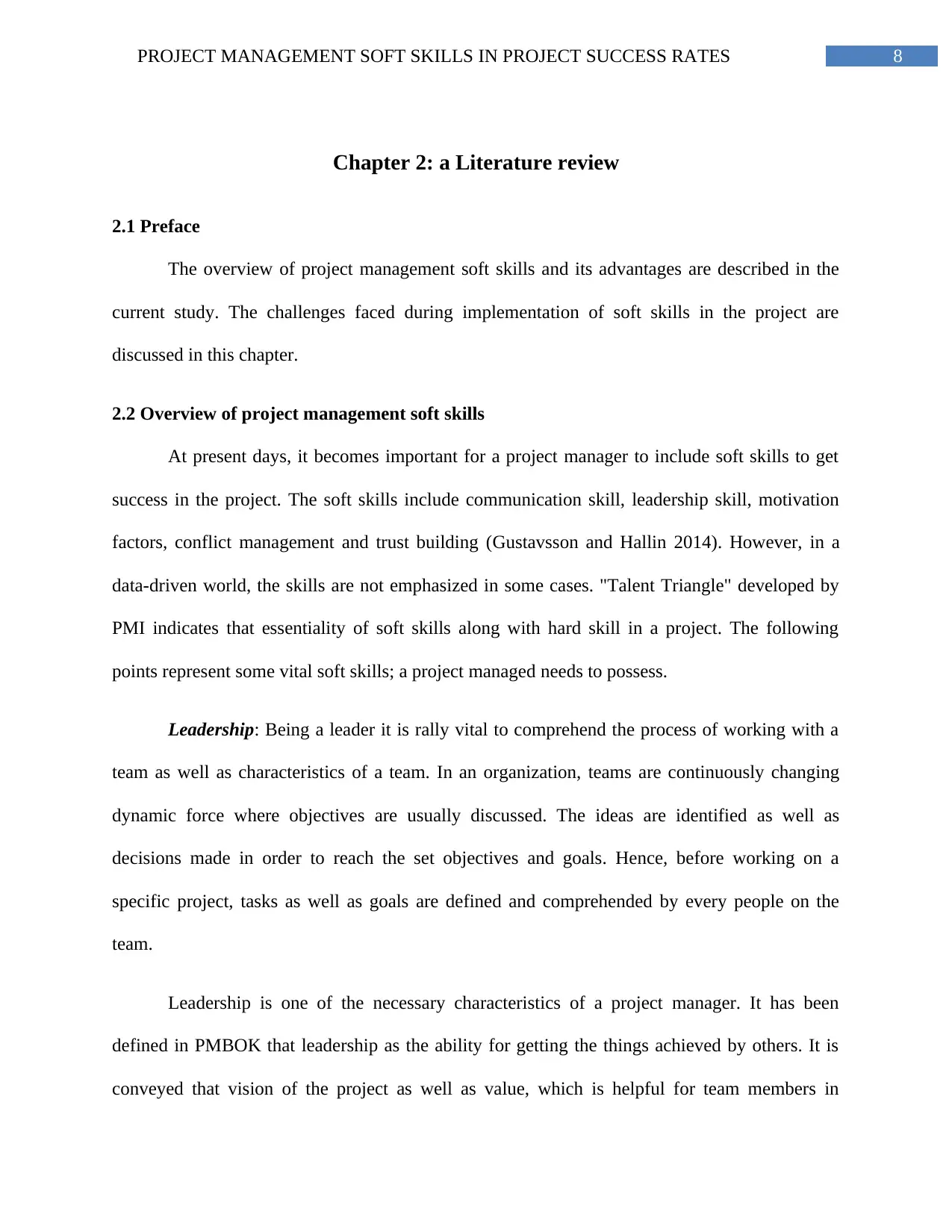
PROJECT MANAGEMENT SOFT SKILLS IN PROJECT SUCCESS RATES 8
Chapter 2: a Literature review
2.1 Preface
The overview of project management soft skills and its advantages are described in the
current study. The challenges faced during implementation of soft skills in the project are
discussed in this chapter.
2.2 Overview of project management soft skills
At present days, it becomes important for a project manager to include soft skills to get
success in the project. The soft skills include communication skill, leadership skill, motivation
factors, conflict management and trust building (Gustavsson and Hallin 2014). However, in a
data-driven world, the skills are not emphasized in some cases. "Talent Triangle" developed by
PMI indicates that essentiality of soft skills along with hard skill in a project. The following
points represent some vital soft skills; a project managed needs to possess.
Leadership: Being a leader it is rally vital to comprehend the process of working with a
team as well as characteristics of a team. In an organization, teams are continuously changing
dynamic force where objectives are usually discussed. The ideas are identified as well as
decisions made in order to reach the set objectives and goals. Hence, before working on a
specific project, tasks as well as goals are defined and comprehended by every people on the
team.
Leadership is one of the necessary characteristics of a project manager. It has been
defined in PMBOK that leadership as the ability for getting the things achieved by others. It is
conveyed that vision of the project as well as value, which is helpful for team members in
Chapter 2: a Literature review
2.1 Preface
The overview of project management soft skills and its advantages are described in the
current study. The challenges faced during implementation of soft skills in the project are
discussed in this chapter.
2.2 Overview of project management soft skills
At present days, it becomes important for a project manager to include soft skills to get
success in the project. The soft skills include communication skill, leadership skill, motivation
factors, conflict management and trust building (Gustavsson and Hallin 2014). However, in a
data-driven world, the skills are not emphasized in some cases. "Talent Triangle" developed by
PMI indicates that essentiality of soft skills along with hard skill in a project. The following
points represent some vital soft skills; a project managed needs to possess.
Leadership: Being a leader it is rally vital to comprehend the process of working with a
team as well as characteristics of a team. In an organization, teams are continuously changing
dynamic force where objectives are usually discussed. The ideas are identified as well as
decisions made in order to reach the set objectives and goals. Hence, before working on a
specific project, tasks as well as goals are defined and comprehended by every people on the
team.
Leadership is one of the necessary characteristics of a project manager. It has been
defined in PMBOK that leadership as the ability for getting the things achieved by others. It is
conveyed that vision of the project as well as value, which is helpful for team members in
⊘ This is a preview!⊘
Do you want full access?
Subscribe today to unlock all pages.

Trusted by 1+ million students worldwide
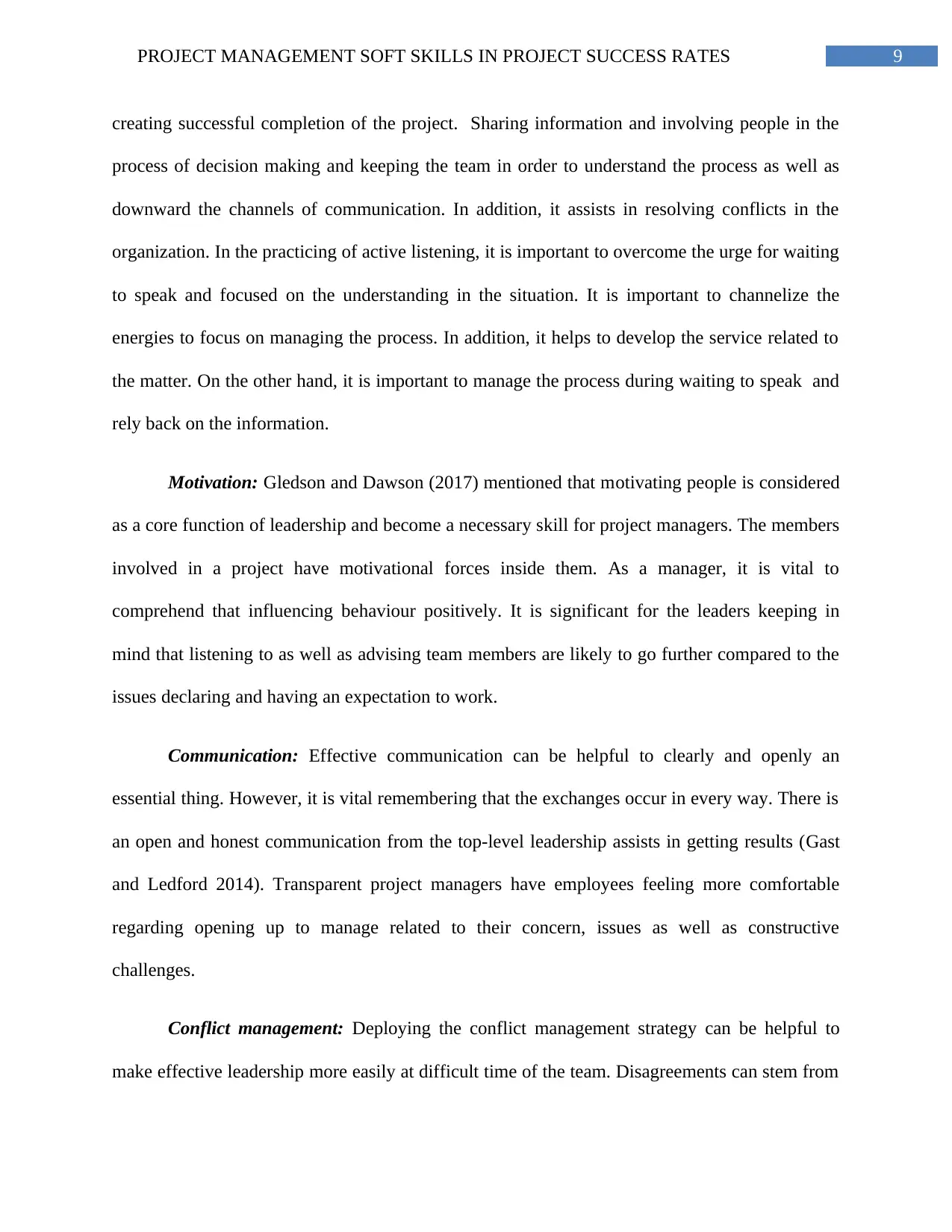
PROJECT MANAGEMENT SOFT SKILLS IN PROJECT SUCCESS RATES 9
creating successful completion of the project. Sharing information and involving people in the
process of decision making and keeping the team in order to understand the process as well as
downward the channels of communication. In addition, it assists in resolving conflicts in the
organization. In the practicing of active listening, it is important to overcome the urge for waiting
to speak and focused on the understanding in the situation. It is important to channelize the
energies to focus on managing the process. In addition, it helps to develop the service related to
the matter. On the other hand, it is important to manage the process during waiting to speak and
rely back on the information.
Motivation: Gledson and Dawson (2017) mentioned that motivating people is considered
as a core function of leadership and become a necessary skill for project managers. The members
involved in a project have motivational forces inside them. As a manager, it is vital to
comprehend that influencing behaviour positively. It is significant for the leaders keeping in
mind that listening to as well as advising team members are likely to go further compared to the
issues declaring and having an expectation to work.
Communication: Effective communication can be helpful to clearly and openly an
essential thing. However, it is vital remembering that the exchanges occur in every way. There is
an open and honest communication from the top-level leadership assists in getting results (Gast
and Ledford 2014). Transparent project managers have employees feeling more comfortable
regarding opening up to manage related to their concern, issues as well as constructive
challenges.
Conflict management: Deploying the conflict management strategy can be helpful to
make effective leadership more easily at difficult time of the team. Disagreements can stem from
creating successful completion of the project. Sharing information and involving people in the
process of decision making and keeping the team in order to understand the process as well as
downward the channels of communication. In addition, it assists in resolving conflicts in the
organization. In the practicing of active listening, it is important to overcome the urge for waiting
to speak and focused on the understanding in the situation. It is important to channelize the
energies to focus on managing the process. In addition, it helps to develop the service related to
the matter. On the other hand, it is important to manage the process during waiting to speak and
rely back on the information.
Motivation: Gledson and Dawson (2017) mentioned that motivating people is considered
as a core function of leadership and become a necessary skill for project managers. The members
involved in a project have motivational forces inside them. As a manager, it is vital to
comprehend that influencing behaviour positively. It is significant for the leaders keeping in
mind that listening to as well as advising team members are likely to go further compared to the
issues declaring and having an expectation to work.
Communication: Effective communication can be helpful to clearly and openly an
essential thing. However, it is vital remembering that the exchanges occur in every way. There is
an open and honest communication from the top-level leadership assists in getting results (Gast
and Ledford 2014). Transparent project managers have employees feeling more comfortable
regarding opening up to manage related to their concern, issues as well as constructive
challenges.
Conflict management: Deploying the conflict management strategy can be helpful to
make effective leadership more easily at difficult time of the team. Disagreements can stem from
Paraphrase This Document
Need a fresh take? Get an instant paraphrase of this document with our AI Paraphraser
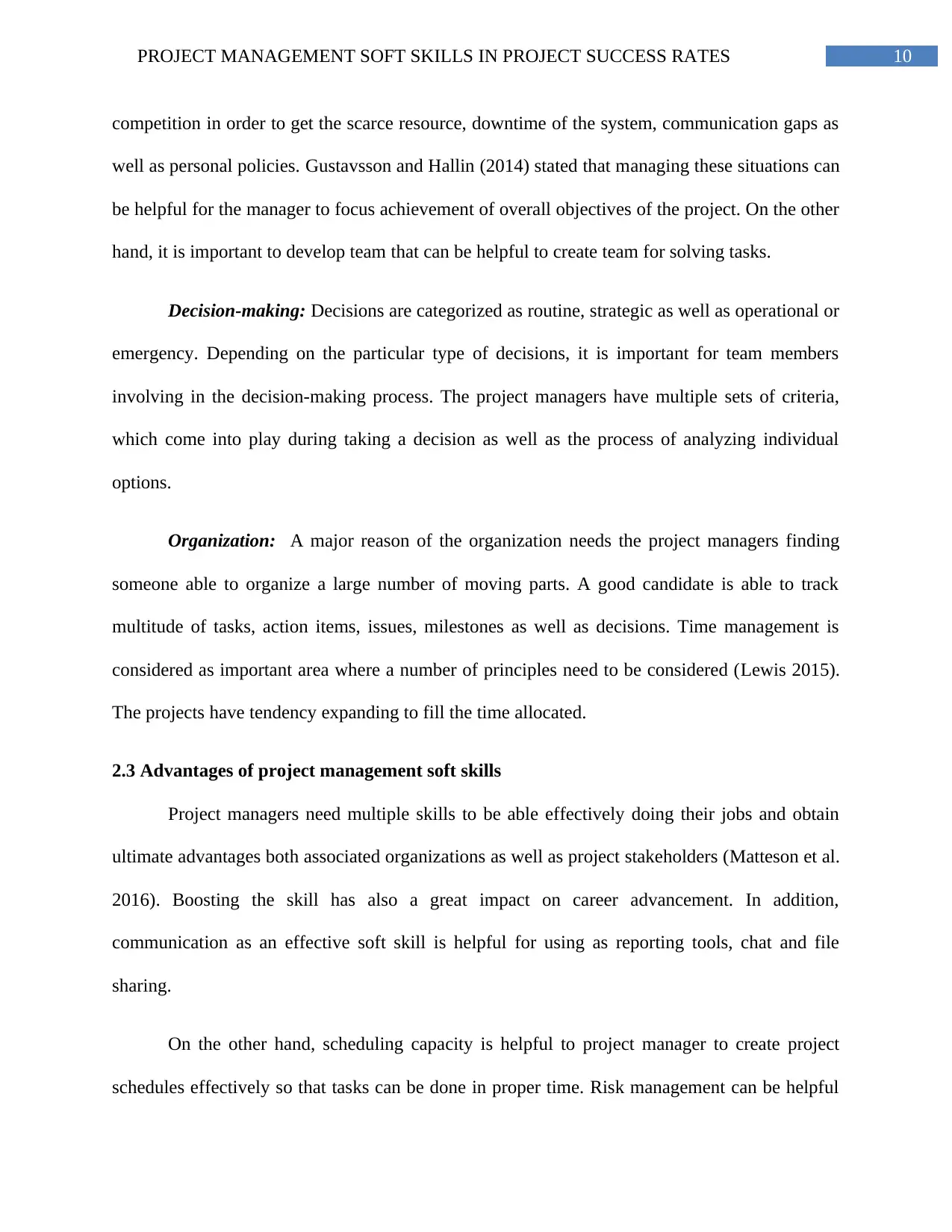
PROJECT MANAGEMENT SOFT SKILLS IN PROJECT SUCCESS RATES 10
competition in order to get the scarce resource, downtime of the system, communication gaps as
well as personal policies. Gustavsson and Hallin (2014) stated that managing these situations can
be helpful for the manager to focus achievement of overall objectives of the project. On the other
hand, it is important to develop team that can be helpful to create team for solving tasks.
Decision-making: Decisions are categorized as routine, strategic as well as operational or
emergency. Depending on the particular type of decisions, it is important for team members
involving in the decision-making process. The project managers have multiple sets of criteria,
which come into play during taking a decision as well as the process of analyzing individual
options.
Organization: A major reason of the organization needs the project managers finding
someone able to organize a large number of moving parts. A good candidate is able to track
multitude of tasks, action items, issues, milestones as well as decisions. Time management is
considered as important area where a number of principles need to be considered (Lewis 2015).
The projects have tendency expanding to fill the time allocated.
2.3 Advantages of project management soft skills
Project managers need multiple skills to be able effectively doing their jobs and obtain
ultimate advantages both associated organizations as well as project stakeholders (Matteson et al.
2016). Boosting the skill has also a great impact on career advancement. In addition,
communication as an effective soft skill is helpful for using as reporting tools, chat and file
sharing.
On the other hand, scheduling capacity is helpful to project manager to create project
schedules effectively so that tasks can be done in proper time. Risk management can be helpful
competition in order to get the scarce resource, downtime of the system, communication gaps as
well as personal policies. Gustavsson and Hallin (2014) stated that managing these situations can
be helpful for the manager to focus achievement of overall objectives of the project. On the other
hand, it is important to develop team that can be helpful to create team for solving tasks.
Decision-making: Decisions are categorized as routine, strategic as well as operational or
emergency. Depending on the particular type of decisions, it is important for team members
involving in the decision-making process. The project managers have multiple sets of criteria,
which come into play during taking a decision as well as the process of analyzing individual
options.
Organization: A major reason of the organization needs the project managers finding
someone able to organize a large number of moving parts. A good candidate is able to track
multitude of tasks, action items, issues, milestones as well as decisions. Time management is
considered as important area where a number of principles need to be considered (Lewis 2015).
The projects have tendency expanding to fill the time allocated.
2.3 Advantages of project management soft skills
Project managers need multiple skills to be able effectively doing their jobs and obtain
ultimate advantages both associated organizations as well as project stakeholders (Matteson et al.
2016). Boosting the skill has also a great impact on career advancement. In addition,
communication as an effective soft skill is helpful for using as reporting tools, chat and file
sharing.
On the other hand, scheduling capacity is helpful to project manager to create project
schedules effectively so that tasks can be done in proper time. Risk management can be helpful
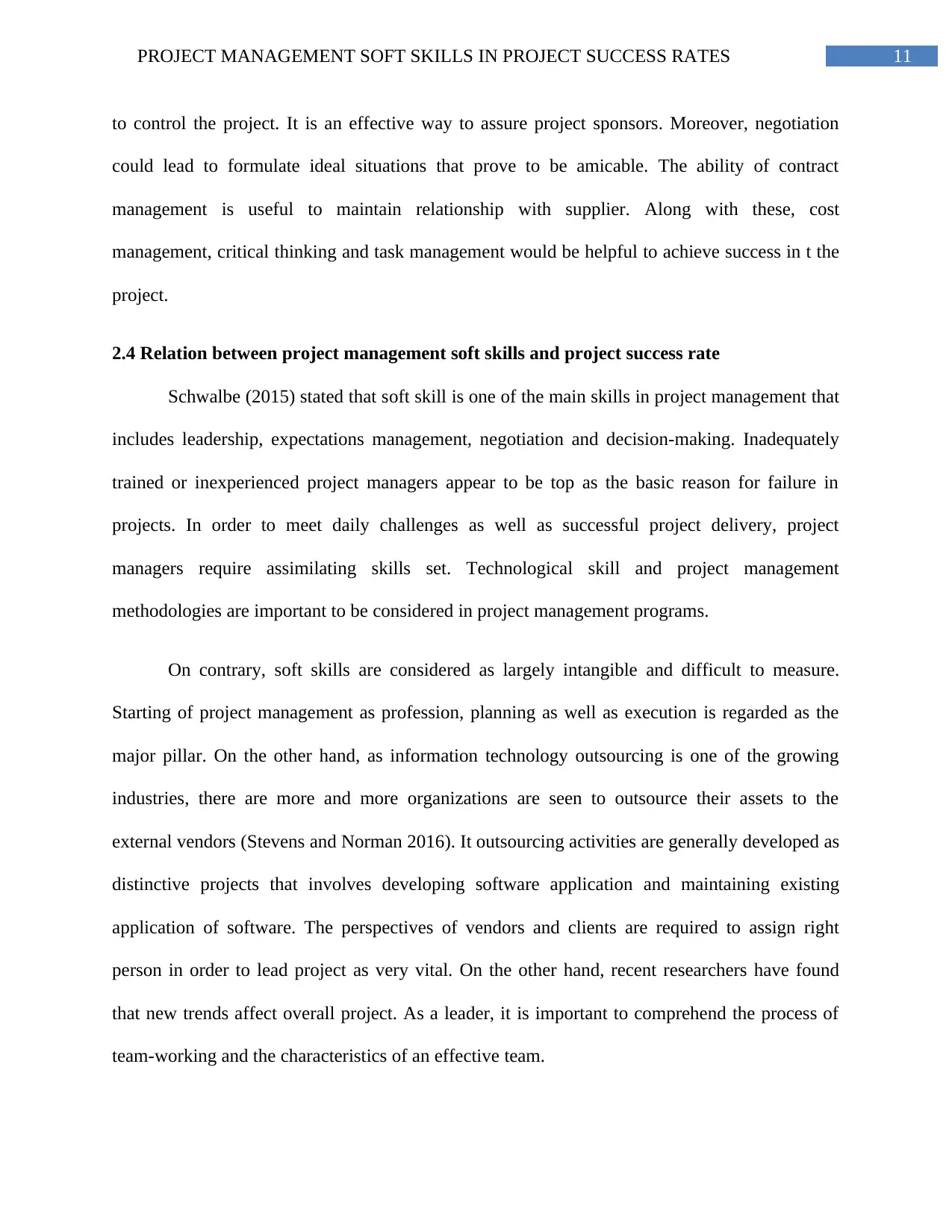
PROJECT MANAGEMENT SOFT SKILLS IN PROJECT SUCCESS RATES 11
to control the project. It is an effective way to assure project sponsors. Moreover, negotiation
could lead to formulate ideal situations that prove to be amicable. The ability of contract
management is useful to maintain relationship with supplier. Along with these, cost
management, critical thinking and task management would be helpful to achieve success in t the
project.
2.4 Relation between project management soft skills and project success rate
Schwalbe (2015) stated that soft skill is one of the main skills in project management that
includes leadership, expectations management, negotiation and decision-making. Inadequately
trained or inexperienced project managers appear to be top as the basic reason for failure in
projects. In order to meet daily challenges as well as successful project delivery, project
managers require assimilating skills set. Technological skill and project management
methodologies are important to be considered in project management programs.
On contrary, soft skills are considered as largely intangible and difficult to measure.
Starting of project management as profession, planning as well as execution is regarded as the
major pillar. On the other hand, as information technology outsourcing is one of the growing
industries, there are more and more organizations are seen to outsource their assets to the
external vendors (Stevens and Norman 2016). It outsourcing activities are generally developed as
distinctive projects that involves developing software application and maintaining existing
application of software. The perspectives of vendors and clients are required to assign right
person in order to lead project as very vital. On the other hand, recent researchers have found
that new trends affect overall project. As a leader, it is important to comprehend the process of
team-working and the characteristics of an effective team.
to control the project. It is an effective way to assure project sponsors. Moreover, negotiation
could lead to formulate ideal situations that prove to be amicable. The ability of contract
management is useful to maintain relationship with supplier. Along with these, cost
management, critical thinking and task management would be helpful to achieve success in t the
project.
2.4 Relation between project management soft skills and project success rate
Schwalbe (2015) stated that soft skill is one of the main skills in project management that
includes leadership, expectations management, negotiation and decision-making. Inadequately
trained or inexperienced project managers appear to be top as the basic reason for failure in
projects. In order to meet daily challenges as well as successful project delivery, project
managers require assimilating skills set. Technological skill and project management
methodologies are important to be considered in project management programs.
On contrary, soft skills are considered as largely intangible and difficult to measure.
Starting of project management as profession, planning as well as execution is regarded as the
major pillar. On the other hand, as information technology outsourcing is one of the growing
industries, there are more and more organizations are seen to outsource their assets to the
external vendors (Stevens and Norman 2016). It outsourcing activities are generally developed as
distinctive projects that involves developing software application and maintaining existing
application of software. The perspectives of vendors and clients are required to assign right
person in order to lead project as very vital. On the other hand, recent researchers have found
that new trends affect overall project. As a leader, it is important to comprehend the process of
team-working and the characteristics of an effective team.
⊘ This is a preview!⊘
Do you want full access?
Subscribe today to unlock all pages.

Trusted by 1+ million students worldwide
1 out of 48
Related Documents
Your All-in-One AI-Powered Toolkit for Academic Success.
+13062052269
info@desklib.com
Available 24*7 on WhatsApp / Email
![[object Object]](/_next/static/media/star-bottom.7253800d.svg)
Unlock your academic potential
Copyright © 2020–2026 A2Z Services. All Rights Reserved. Developed and managed by ZUCOL.





